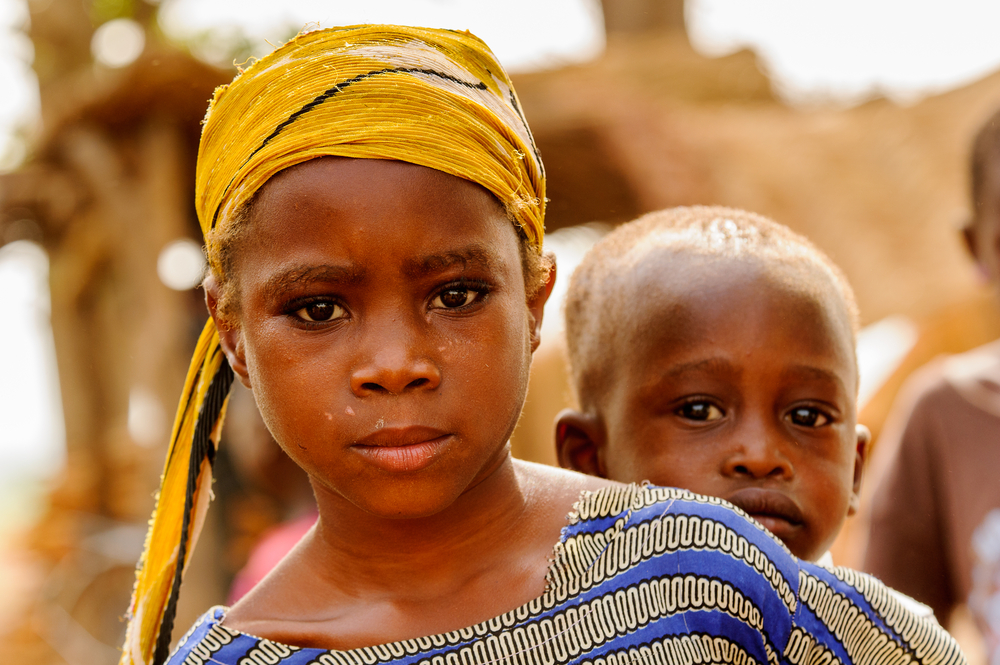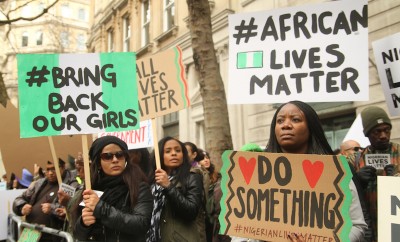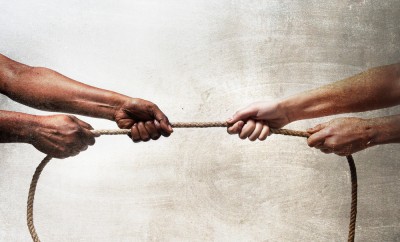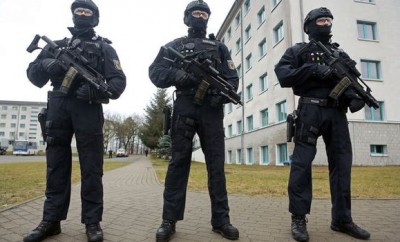Africa
How Boko Haram played us for international recognition

Image: Anton_Ivanov / Shutterstock.com_
Somewhere in Nigeria, Amina prays. It’s been 6 months since she was abducted at school by the Boko Haram soldiers, torn violently from the one place she had come to call home. The whole incident is a blur, one minute she’s confined to the safety of her dormitory, respectfully paying homage to nature with her snores and the next, she’s being forced, at gunpoint, into a dark musty van, transported, along with 266 other girls, to a terrorist camp. Her cries yield no response, nor do her pleas for mercy. These men obviously have neither heart, nor compassion as they tear her legs apart in the dead of the night, muffle her screams with stuffed rags and plant unwanted fetuses in her; there’s three of them and their only form of identification lies in their distinctive groans, sounds which come back to haunt her when they point guns to her head and force her to slit the throats of unassuming strangers. Yes, she and the 266 others would become either wives or soldiers. Only yesterday, she was able to escape from the Boko Haram camp in the dead of the night, tearing through the bushes in her wrapper and flip-flops, until she, finally, found herself in a familiar environment. Her return did not bring as much happiness as she expected, no overwhelming hugs or impromptu celebrations, only rejection. No one speaks to her but their silence is heavy with so many words, “She is a disgrace, an outcast who bears the seed of a terrorist.” She’ll remain under that mango tree, on the outskirts of town, with nothing but her wrapper and her flip-flops, her only crime being the choice of education. She is only sixteen, so all she can do is pray.
On the night of April 14 2014, Islamic sect Boko Haram infiltrated and kidnapped, from a secondary school dorm in Chibok, Northern Nigeria, 267 young girls, the essence of which, until today, can never fully be captured by words. Tearing teenage girls from their families, violating and then turning them to killers is a drastic, inhumane shift from the more familiar bombing strategies that is usually employed by terrorists. It’s distasteful, disturbing, disgusting, and devastatingly wicked to the victims and their families who, every day for the past two years, have been forced to relive the pain of this horrific event.
The Chibok incident was the proverbial last straw that broke the camel’s back, driving the entire world into a state of sickened shock. Internationally, a spotlight was focused on Nigeria, and Boko Haram was placed on the United States’ list of terrorist organizations. What started as a mostly-unheard of fundamentalist Islamic sect promoting Sharia law and advocating against police corruption, became, in the blink of an eye, an internationally known, infamous, terrorist organization. Imagine the reaction of Abubakar Shekau, current Boko Haram leader and mastermind behind the Chibok kidnapping, to this newly found fame. Not fear, not remorse, not a systematic decision to lay low for the time being, but instead, a surprising wave of boldness. His remarks, “Our strength and firepower is bigger than that of Nigeria. Nigeria is no longer a big deal to us, as far as we are concerned. We will now comfortably confront the United States of America.”
The origin of Boko Haram, which literally translates to, “Western education is a sacrilege,” dates as far back as the pre-colonization of Nigeria itself in the 1800s. Before Western imperialism extended its roots to Nigerian soil, Islamic jihadists had imposed their religion on the occupants of the northern sector of Nigeria via coerced mass conversions, leading to the eventual spread of Islam in that region. When colonialism, subsequently, began to take shape, there was a strong resistance by the new converts, one which was, ultimately, unsuccessful. This bore an innate resentment against Western influence, in the hearts of a few, since then, till now.
In 2002, Mohammed Yusuf, supposedly taking a cue from controversial anti-West preacher Mohammed Marwa (Maitatsine), founded Boko Haram with the aim of opposing Western education and speaking against Nigeria’s corrupt government. The government, he believed, was ultimately detrimental to the nation given its strong relation to Western imperialism. Influenced by the Wahhabi theology, a branch of Sunni Islam that is ultraconservative and reformative towards a monotheistic worship, Yusuf believed that an imposition of Sharia law, rather than a democratic process was the only way to end this corruption. He, thus, appealed to jobless youth, whose distaste at the economical state of the country was all the motivation that was needed.
For the first seven years of its existence, Boko Haram, though radical, operated as a non-violent sect. This changed in 2009, however, when they, as a group, decided to demonstrate for the first time in Yobe state. To them, the law requiring motorcycle riders to don helmets for their safety was too Western and somewhat un-Islamic. Their actions led to the arrest of some of its members, ultimately, resulting in a riot between them and the Nigerian police. In the end, 800 people were confirmed dead, including founder and former leader, Mohammed Yusuf.
The killing of Mohammed Yusuf, many had hoped, would see the end of this tyrannical sect but, like a Hydra, cutting off the head only resulted in the growth of another. In 2009, Abubakar Shekau, Yusuf’s second in command, undertook leadership of the group—a man now described as a“religious fanatic with unmatched brutality” for his crude tactics and for reportedly liaising with known terror group Al Qaeda. Although the validity of the afore mentioned claim was, at the time, unknown, there was an increase in violence and attacks from the sect, which included, but was not limited to, the Bauchi prison break, razing of villages and the bombing of the UN headquarters in Abuja (see timeline of attacks here). None of these attacks, however, were able to elicit substantial international response from Western powers, for varying reasons, including the fact that an official assignment of Boko Haram to the US list of terrorist organizations would direct international spotlight to the militant group and skyrocket their reputation. One might as well conclude that this was the exact desire of the newly re-branded Boko Haram sect, whose latest goals included the creation of an Islamic state in Nigeria. Similar to that of ISIS, it would take more than the reputation of small town vandals to get them what they wanted, with the added possibility of increased funding from other terror organizations especially because they had, for the longest period, funded their operations through bank robberies and kidnapping.
The Boko Haram sect has operated for years in Nigeria, terrorizing mostly Northern states, yet it took the kidnapping of 267 teenagers to draw the world’s attention. It is rarely coincidental that immediately after this, the organization became emboldened to, not only threaten the US but also, pledge allegiance to ISIS. Although, placing Boko Haram on the list of terror organizations was undoubtedly the proper thing to do, the US had been right in its reservations all along, that doing so would “raise its profile, give it greater publicity, give it greater credibility, help in its recruitment, and also probably drive more assistance in its direction.” In this case, it was all the validation they needed to hang with the big dogs (ISIS) and threaten the world’s most noted power, the United States. Every attack by Boko Haram after the killing of Mohammed Yusuf was a systematic attempt to garner worldwide recognition. Chibok, was only the last straw to break the camel’s back.





0 comments